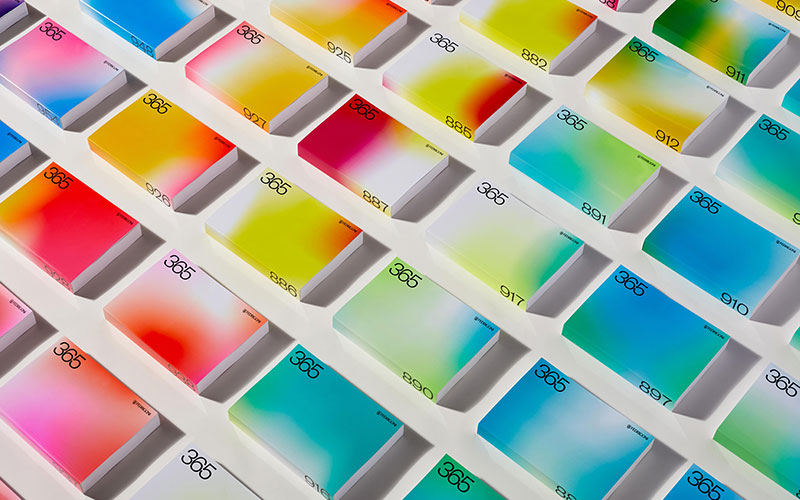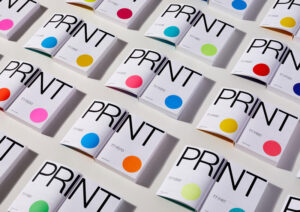
By Brittany Willes, writer, PostPress
Every year, the release of the Fedrigoni 365 Calendar is eagerly awaited by designers and creatives. When it came time to create the 2021 edition, Fedrigoni UK – in collaboration with design agency TM, data management company Ricoh and Meccanotecnica Book Finishing Solutions – assembled to create a piece that would “explore digital printing capabilities, variable data technology and state-of-the-art finishing at their limits,” said Stefano Formentini, marketing manager for Meccanotecnica. The result was something truly special.
 To start, designers were asked to contribute a design for a randomly assigned date of the year. Using Ricoh’s data management solution, “Each book then was composed algorithmically, with designs pulled at random and assigned to a date,” Formentini explained. Every book comprises its own combination and sequence of designs, with a unique cover produced from a random placement of two-color gradients and wrapped in a translucent paper with the names of the designers featured in that version in white toner and the remaining set in a light tint. The result was 4,000 entirely unique calendars.
To start, designers were asked to contribute a design for a randomly assigned date of the year. Using Ricoh’s data management solution, “Each book then was composed algorithmically, with designs pulled at random and assigned to a date,” Formentini explained. Every book comprises its own combination and sequence of designs, with a unique cover produced from a random placement of two-color gradients and wrapped in a translucent paper with the names of the designers featured in that version in white toner and the remaining set in a light tint. The result was 4,000 entirely unique calendars.
“Digital printing has enabled print-on-demand and variable-data-printing to generate a new range of books, as well as allowed opportunities unthinkable only a few years ago,” said Formentini. The Fedrigoni 2021 calendar made full use of these new opportunities.
“This project shows the tremendous potential of digital print finishing,” affirmed Manrico Caglioni, president of Book Automation – the US branch of the Meccanotecnica Group. “If you can think it, you can do it, and it can be a testament to your creativity far into the future.”
To create the calendar, a combination of three diverse paper stocks was selected from the Fedrigoni digital range of papers. The cover was done with Fedrigoni Splendorlux Premium White stock, the jacket with Fedrigoni Golden Star K Extra White and the inner pages with Fedrigoni Freelife Vellum Premium White stock.
The calendar was digitally printed on a five-color Ricoh Pro™ C7200x digital color sheetfed system, chosen for its ability to print with neon, white, clear and invisible red toners. “For Fedrigoni 365, its ability to dramatize print with neon pink and yellow, as well as white, was exploited to full effect,” Formentini said.
 When it came to the binding, Fedrigoni UK called on Meccanotecnica to produce cost-effective, high-quality books. The calendars were bound using Meccanotecnica’s UNIVERSETM automatic book folding and sewing machine.
When it came to the binding, Fedrigoni UK called on Meccanotecnica to produce cost-effective, high-quality books. The calendars were bound using Meccanotecnica’s UNIVERSETM automatic book folding and sewing machine.
Meccanotecnica’s INLINE back gluer was used for the book block – both gauze and cover – to make the spine less rigid, thereby improving the lay-flat property of the paperback book. The binding for the calendar was accomplished by nipping the spine of the sewn book blocks, then gluing the back and sides before applying the gauze and cover.
 To complete the finishing process, the 2021 calendar was trimmed using Meccanotecnica’s automatic three-knife trimmer.
To complete the finishing process, the 2021 calendar was trimmed using Meccanotecnica’s automatic three-knife trimmer.
Given the final product consisted of 4,000 unique calendars, it comes as little surprise the production process experienced some challenges along the way. According to Formentini, “The main challenge of this project was the management of the extreme level of personalization of the books. Each calendar was bespoke and unique, dynamically created by a Ricoh end-to-end workflow.”
Meccanotecnica had to consider this dynamic when it came to the binding process. As a result, it had to monitor every single production step. “A reliable control system was essential to produce the Fedrigoni 365 Calendars,” Formentini said.
To that end, during the book sewing process, a GigaLynx™ camera system was used to verify sequence integrity by reading barcodes or images, avoiding errors well before any given section was sewn – allowing the saving of the books.
Furthermore, “In the back gluer,” Formentini continued, “every book block had to be matched with its unique cover. During this, the GigaLynxTM control cameras – positioned at the in-feed of the machine and at the cover feeder – played an essential role.”
When the 4,000 calendars were complete, each participating creative received a copy, which included their design and their name personalized on the back cover – an impressive level of personalization. As Formentini noted, a number of the calendars can be purchased online via Counter-Print, with profits donated to charity. “The 2021 edition supports Teenage Cancer Trust,” he said. To date, more than 750 copies have been sold.
In the end, pushing the limits of digital printing certainly paid off for all involved in the project. “Due to the pandemic, the usual launch event was unable to take place,” Formentini stated. “However, the online reception was absolutely fantastic. Designers’ social media were flooded with neon gradients, and we received many heartfelt words of appreciation from contributors.”

